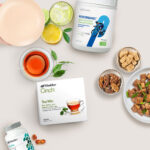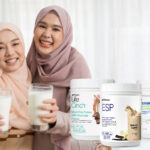Everyday Shake Protein for the Whole Family
Everyday Shake Protein
for the Whole Family
Adequate protein intake daily does wonders for your health. Discover 5 key benefits that can significantly improve your overall well-being.
Did You Know?
Muscle mass deceases 3 – 8% per decade after the age of 30 and this rate of decline is even higher after 601.
Radiant Skin & Lustrous Hair
- Boost collagen2 and elastin production to firm up your skin.
- Encourage keratin production for stronger, shinier hair and healthier nails3.
Who needs it? Everyone!
Energy Booster
- Promotes steady blood glucose level to sustain energy all day long.
Who needs it?
Multitasking moms and working adults always on-the-go who need a little energy booster!
Prevents Heart Diseases
- Great for lowering LDL cholesterol5, often called the “bad” cholesterol,
reducing the risk of heart disease.
Who needs it? The elderly and those who consumed a high fat diet.

Boosts Muscle Growth
- Promotes muscle protein production4, enhancing muscle strength.
- Prevent the breakdown of lean muscle tissue and supports healthy muscle
growth.
Who needs it? Growing teenagers, workout buddies and the elderly.
Reduces Menopausal Symptoms
- Soy contains plant estrogens called “soy isoflavones” which may help reduce menopause symptoms such as hot flashes6, insomnia and fatigue7. These soy phytoestrogens help prevent bone loss in menopausal women, maintaining stronger bones.8
Who needs it? All women!
References:
1. Holloszy, J. O. (2000). The biology of aging. The Journals of Gerontology Series A: Biological Sciences and Medical Sciences, 75(Suppl), S3-S8; discussion S8-S9. https://doi.org/10.1093/gerona/55.suppl_1.s3
2. Rizzo, J., et al. (2023). Soy protein containing isoflavones improves facial signs of photoaging and skin hydration in postmenopausal women: Results of a prospective randomized double-blind controlled trial. Nutrients, 15(19),
4113. https://doi.org/10.3390/nu15194113
3. Blair, R. M., & Tabor, A. (2009). The beauty of soy for skin, hair, and nails. In R. C. R. Martins (Ed.), Nutritional cosmetics: Beauty from within (pp. 441-468). William Andrew Publishing. https://doi.org/10.1016/B978-0-8155-2029-0.50030-2
4. Zare, R., et al. (2023). Effect of soy protein supplementation on muscle adaptations, metabolic and antioxidant status, hormonal response, and exercise performance of active individuals and athletes: A systematic review of randomised controlled trials. Sports Medicine, 53(12), 2417–2446. https://doi.org/10.1007/s40279-023-01899-w
5. Nutrition Committee of the AHA. (2000). Soy protein and cardiovascular disease: A statement for healthcare professionals. Circulation, 102(20), 2555–2559. https://doi.org/10.1161/01.CIR.102.20.2555
6. Cianci A, Colacurci N, Paoletti AM, Perino A, Cicinelli E, et al. (2015) Soy isoflavones, inulin, calcium, and vitamin D3 in post-menopausal hot flushes: An observational study. Clin Exp Obstet Gynecol 42(6): 743-745.
7. Hirose A, Terauchi M, Osaka Y, Akiyoshi M, Kato K, et al. (2018) Effect of soy lecithin on fatigue and menopausal symptoms in middle-aged women: A randomized, double-blind, placebo-controlled study. Nutrition journal 17(1): 4.
8. Levis S, Strickman Stein N, Ganjei Azar P, Xu P, Doerge DR, et al. (2011) Soy isoflavones in the prevention of menopausal bone loss and menopausal symptoms: A randomized, double-blind trial. Archives of internal medicine
171(15): 1363-1369.







